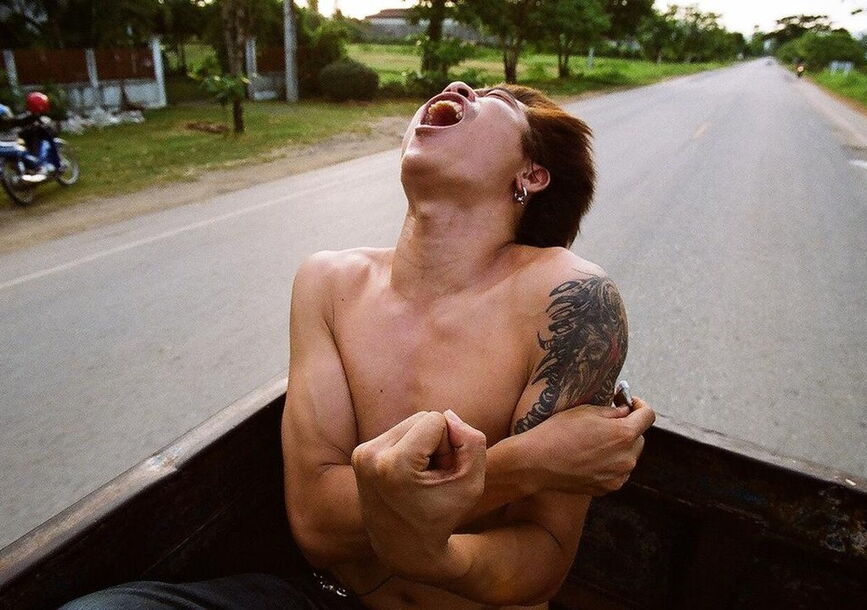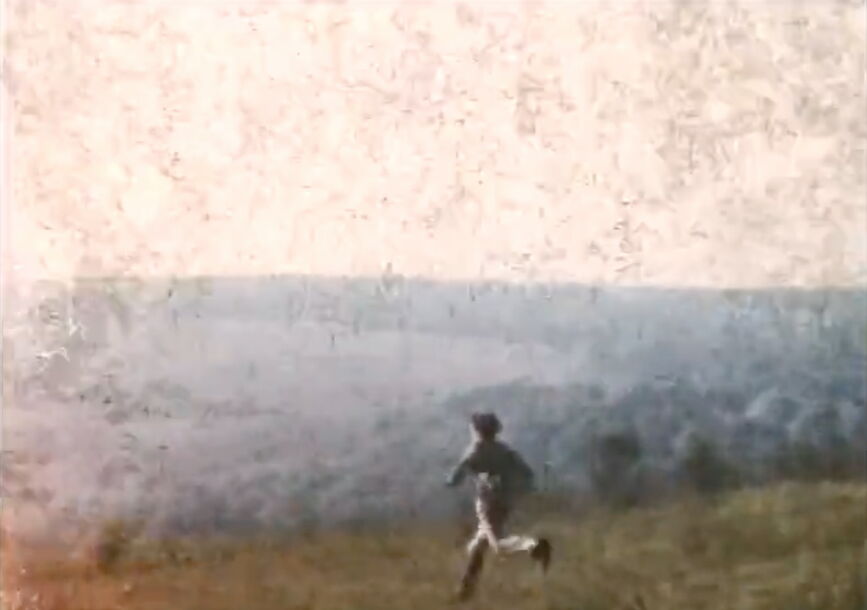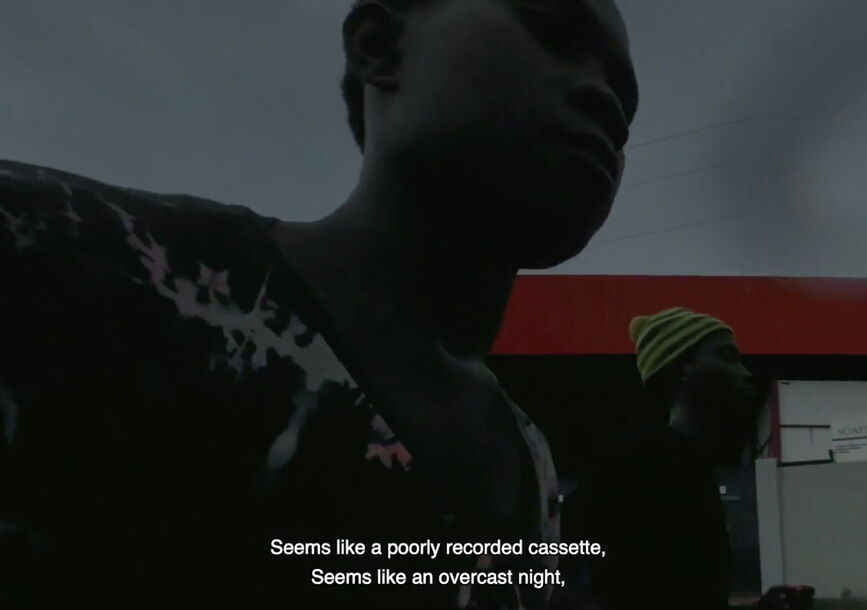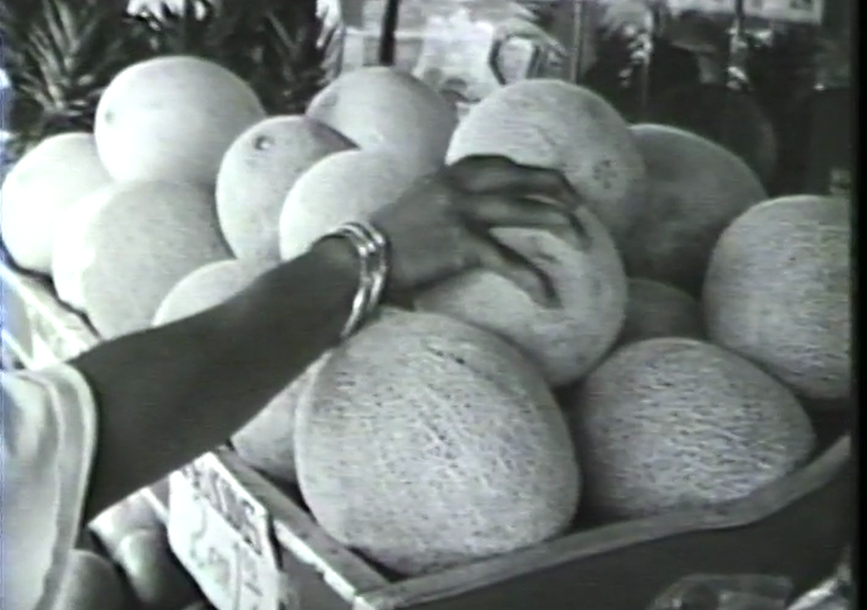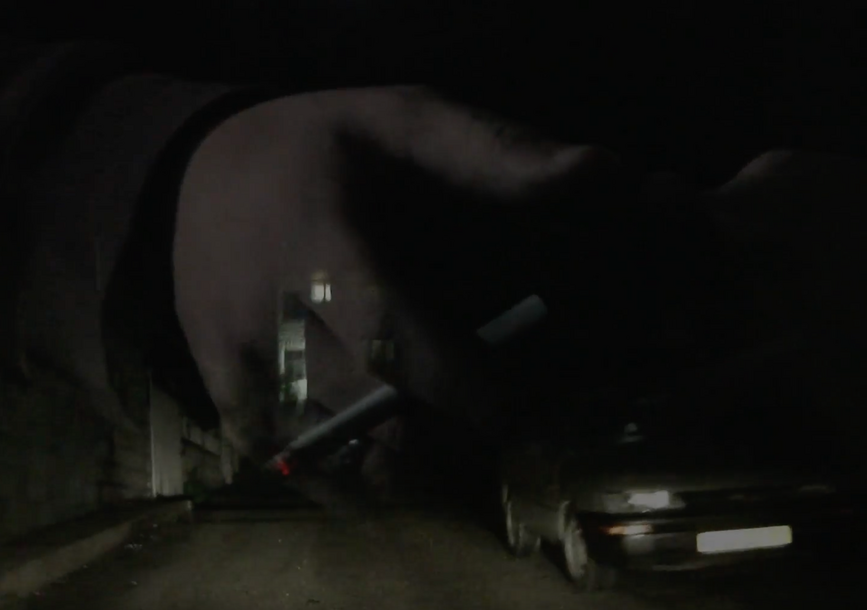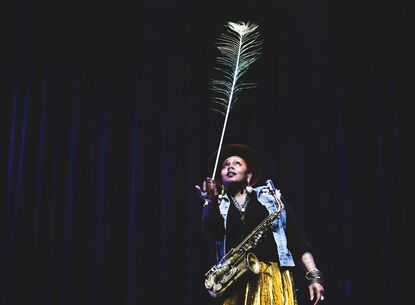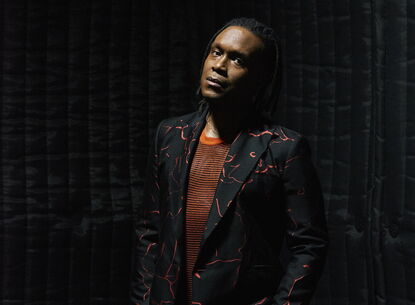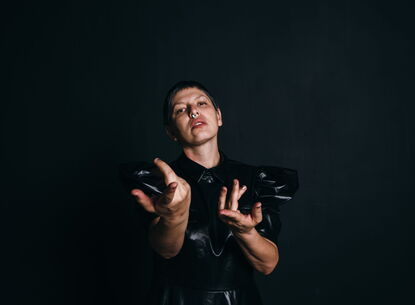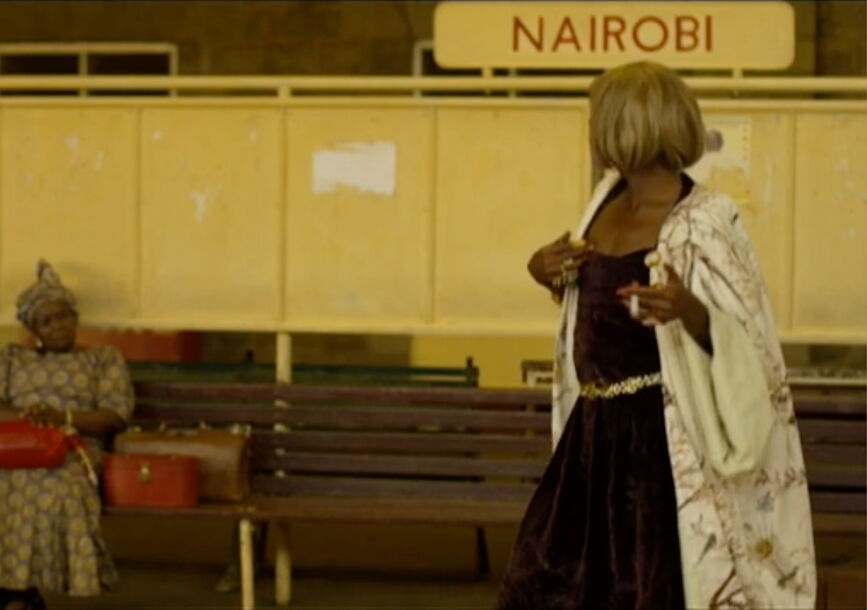
about the artists
Chrystel Oloukoï
Chrystel Oloukoï is a researcher and moving image artist, as well as freelance film critic and curator currently based in Richmond, Virginia previously in Lagos, Boston, New Orleans, Johannesburg, and Paris.
They hold a BA and MA in Geography from the University Paris 1—Panthéon Sorbonne. Currently, they are completing a PhD in African and African American Studies at Harvard University, with concentrations in Social Anthropology, Critical Media Practice, and Women Gender and Sexuality, and are a predoctoral fellow at the Carter G. Woodson Institute at the University of Virginia. Their dissertation “Night/life: Maroon Ecologies of the Night in Lagos” and the series of experimental short films entitled black nocturnal explore imaginations of the night in Lagos and the afterlives of colonial technologies of temporal discipline.
They have curated a number of programs on experimental cinema, queer cinema, and Black continental and diasporic cinema, including the forthcoming “Black Women Experimental Filmmakers” in collaboration with Culture Arts Society; “Playing in the Dark: Watery Experiments” for Canyon Cinema; and “Anti-Ethnography”, “Carceral Frames, Fugitive Dreams” and “Queer Celluloid” for the Lagos-based microcinema Monangambee. In partnership with the artist collective hFACTOR and Monangambee, they have organized the inaugural edition of the Lagos Pride Film Festival in June 2022.
Their writing on cinema has appeared in a number of publications, including Metrograph, BFI’s Sight & Sound, World Records Journal and Film Comment.
Jumana Manna
Jumana Manna is a visual artist and filmmaker. Her work explores how power is articulated, focusing on the body, land, and materiality in relation to colonial inheritances and histories of place. Through sculpture, filmmaking, and occasional writing, Manna deals with the paradoxes of preservation practices, particularly within the fields of archaeology, agriculture, and law. Her practice considers the tension between the modernist traditions of categorisation and conservation and the unruly potential of ruination as an integral part of life and its regeneration. Manna was raised in Jerusalem and lives in Berlin.
Lionel Soukaz
Lionel Soukaz (1953, France), a cinematographer and filmmaker, is one of the pioneers of French queer cinema. His work, especially in the first part of his career, reflects a synthesis of the various avant-garde movements he was drawn to in the 1970s and 1980s. Affiliated with the activists and intellectuals, such as Guy Hocquenghem or Copi, at the Homosexual Front for Revolutionary Action and the magazine Gai Pied, he was also active within the experimental film scene, working to promote Super 8 filmmaking at the Festival des Cinémas Différents (Hyères) or Cinémarge (La Rochelle), and ultimately organizing his event in 1978: the first Gay and Lesbian film festival in Paris, Écrans roses et nuits bleues. His films display an uncompromising commitment to self-narration and the expression of desire. But by embodying his unlimited craving for freedom,h his work has often faced censorship. Rediscovered in 2004, thanks mainly to the advocacy of French critic Nicole Brenez, his early film work has been lavishly restored by the CNC (French National Film Board), with the creation of beautiful new 35mm prints. Soukaz is known for Le sexe des anges (1977), The Homosexual Century (1979), and Maman que man (1982).
Dawn Suggs
Dawn Suggs is a media artist, actress, and journalist from St. Louis. Her two shorts, Chasing the Moon (1990) and I Never Danced the Way Girls Were Supposed To (1992), focus on black queer women’s experiences. She has an MFA from UCLA and collaborated with a number of other experimental filmmakers in New York and Los Angeles. She worked on A Litany for Survival (1995), a documentary on Audre Lorde directed by Ada Gay Griffin and Michelle Parkerson.
Amirah Tajdin
Amirah Tajdin is a Kenyan artist and filmmaker. She graduated from Rhodes University with a Bachelor of Fine Art (Photography) in South Africa and Goucher College Maryland (USA). Over a 10-year period of filmmaking, she has crafted a signature style of blending reality with fiction through her strong visual language in both her commercial and cinematic work. She has helmed campaigns for branded content, fashion films, music videos, and television commercials for brands such as Cadillac, Saudi Telecom, Bloomingdale’s, Virgin Mobile, Pepsi, and the Louvre Abu Dhabi. The latter being a case study film for TBWA/RAAD’s Cannes Golden Lion for The Highway Gallery. Her branded content film SISTERHOOD: ACTION for Girls Who Code was a Tribeca X Award 2019 finalist. She is a Sundance Institute fellow, making her the first Kenyan director to be selected for both the institute’s Screenwriters Labs (Utah, 2017) and Director’s Lab (Utah, 2018) for her feature film currently in development. Tajdin’s short film Marea di Tierra was in main competition at Sundance (2016) and Cannes Directors’ Fortnight (2015) and went on to play over 20 festivals globally. She has also directed various award-winning and -nominated short films and feature-ength documentaries. In 2011, she founded SEVEN THIRTY Films, an Africa-based indie production company with her sister, producer Wafa Tajdin. RadicalMedia (London and Berlin) and Loveboat (Paris) represent her for commercials while Scheme Engine (New York and LA) represents her globally for commercials and music videos.
Wafa Tajdin
Wafa Tajdin was born and brought up in one of Africa’s busiest cities, Nairobi. She is no stranger to the patchwork of experiences that are part and parcel of growing up in a 21st century metropolis. A sentiment that has contributed immensely to her choice of academic pursuits—an undergraduate degree in Economics and a master’s degree in Media Studies from the Rhodes School of Journalism in South Africa. A passion for journalism and telling the stories that matter led Wafa onto the path of filmmaking specifically with respect to producing human-interest stories from angles that are innovative, interesting, and relevant to Africa, in particular.
Apichatpong Weerasethakul
Apichatpong Weerasethakul works in the space between cinema and contemporary art, creating installations, videos, and short and feature films that are often nonlinear and transmit a strong sense of dislocation and otherworldliness. Through the manipulation of time and light, Weerasethakul constructs tenuous bridges for the viewer to travel between the real and the mythical, the individual and the collective, the corporeal and the chimeric. Over the years, the majority of his projects have involved many of the same actors, which has allowed him to capture different phases in their lives and their experience of aging. Frequently set in rural Thai villages and forests, his films traverse an extremely personal territory, inviting the viewer to enter the subjective world of memory, myth, and deep yearning. By using unconventional narrative structures, expanding and contracting the sensation of time, and playing with ideas of veracity and linearity: Weerasethakul’s work sits comfortably in a world of his own making. In 1994, Weerasethakul earned his BA in Architecture from Khon Kaen University in Thailand. In 1998, he received his MFA in Filmmaking from the School of the Art Institute of Chicago, as well as an honorary doctorate from the same institution in 2011. In 1999, he cofounded Kick the Machine Films, a company that has produced many of his own films as well as other experimental Thai films and videos that could not find support under the established Thai film industry. The French fovernment named him Chevalier de l’Ordre des Arts et des Lettres and Officier de l’Ordre des Arts et des Lettres in 2008 and 2011, respectively. His art projects and feature films have won him widespread recognition and numerous festival prizes, including three from the Cannes Film Festival: Un Certain Regard for Blissfully Yours in 2002, Prix du Jury for Tropical Malady in 2004, and Palme d’Or for Uncle Boonmee Who Can Recall His Past Lives in 2010. Weerasethakul lives and works in Chiang Mai, Thailand.
Eduardo Williams
Eduardo Williams (born 1987, Argentina) studied at the Universidad del Cine in Buenos Aires, before joining Le Fresnoy—Studio national des arts contemporains in France in 2012. Williams’ short films, Pude ver un puma (2011) and Que je tombe tout le temps? (2013), premiered at Cinéfondation and Directors’ Fortnight at Cannes Film Festival, followed by Tôi quên rồi! (2014), which had its premiere at FIDMarseille. His first feature, El auge del humano (2016), won the Pardo d’oro for Best Film at Filmmakers of the Present at the 69th Locarno Film Festival and was later shown at Toronto International Film Festival’s Wavelengths, New York Film Festival’s Projections, Tate Modern, and other festivals. In 2016, he directed Allons-y! (45 minutes) for the Festival de l’image en mouvement Hors Pistes at Centre Pompidou. In 2019, he received the Lincoln Center Award for Emerging Artists. His last short film Parsi (2018) was produced by the Centre d’Art Contemporain Genève for the Biennale de l’image en Mouvement 2018 and premiered at Berlinale’s Forum Expanded. It was shown at Tate Modern, Julia Stoscheck Collection, Lincoln Center, and other festivals and museums.
FILMS
I Never Danced the Way Girls Were Supposed To (1992)
Dir. Dawn Suggs, 7 min.
Fluorescent Sin (2011)
Dir. Amirah & Wafa Tajdin, 8 min.
Parsi (2019)
Dir. Eduardo Williams, 23 min.
Blessed Blessed Oblivion (2010)
Dir. Jumana Manna, 23 min.
Ballad for a Lonely Man (1968)
Dir. Lionel Soukaz, 18 min.
Mobile Men (2008)
Dir. Apichatpong Weerasethakul, 3 min.
